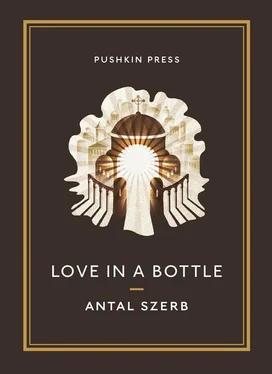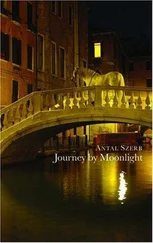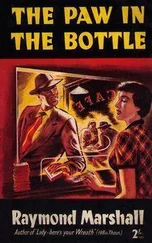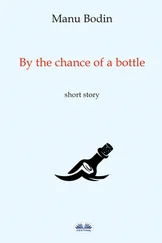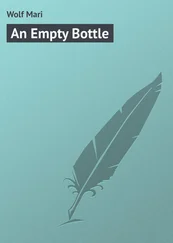Antal Szerb - Love in a Bottle
Здесь есть возможность читать онлайн «Antal Szerb - Love in a Bottle» весь текст электронной книги совершенно бесплатно (целиком полную версию без сокращений). В некоторых случаях можно слушать аудио, скачать через торрент в формате fb2 и присутствует краткое содержание. Год выпуска: 2013, Издательство: Pushkin Press, Жанр: Классическая проза, на английском языке. Описание произведения, (предисловие) а так же отзывы посетителей доступны на портале библиотеки ЛибКат.
- Название:Love in a Bottle
- Автор:
- Издательство:Pushkin Press
- Жанр:
- Год:2013
- ISBN:нет данных
- Рейтинг книги:5 / 5. Голосов: 1
-
Избранное:Добавить в избранное
- Отзывы:
-
Ваша оценка:
- 100
- 1
- 2
- 3
- 4
- 5
Love in a Bottle: краткое содержание, описание и аннотация
Предлагаем к чтению аннотацию, описание, краткое содержание или предисловие (зависит от того, что написал сам автор книги «Love in a Bottle»). Если вы не нашли необходимую информацию о книге — напишите в комментариях, мы постараемся отыскать её.
and
.
Love in a Bottle — читать онлайн бесплатно полную книгу (весь текст) целиком
Ниже представлен текст книги, разбитый по страницам. Система сохранения места последней прочитанной страницы, позволяет с удобством читать онлайн бесплатно книгу «Love in a Bottle», без необходимости каждый раз заново искать на чём Вы остановились. Поставьте закладку, и сможете в любой момент перейти на страницу, на которой закончили чтение.
Интервал:
Закладка:
Regarding the customs people: I once had to go there to register my presence while they opened a parcel that had come addressed to me from some person or persons unknown. I stood trembling before three officials while they withdrew a large cardboard box from its brown paper wrapping. They opened it, very cautiously, and discovered a thick wad of cotton wool. The suspicious wadding was then dissected with professional expertise. Hidden in its depths was a tiny flower — an autumn crocus. The ‘amusing’ Gallic anecdotes that followed showed their true mentality. For my part, I smiled a superior smile and thought it ridiculous to have been summoned to the main offices for this. But at the same time I was deeply moved. For, apart from the rose and carnation, which of course everyone knows, the autumn crocus was the one flower I could identify by name. In fact I am always delighted when I see one, as for once I can be sure that it isn’t a snapdragon, or salvia, but incontrovertibly an autumn crocus.
In other ways too the post stands for the element of unpredictability in my otherwise straightforward life. On one occasion I received an invitation to a ball with “I’ll be there” written on it in an unknown hand. On another occasion I was sent an old-fashioned tie-pin that arrived, as I worked out later, just in time for my name day. Then a Mickey Mouse badge appeared one Christmas Eve. And once, at a time when I was asking myself with particular bitterness just why I had to live in Paris — so far from Budapest, my beloved home — to embrace the self-imposed exile in the cause of greater knowledge that afflicted a whole generation of young Hungarians between 1924 and 1930, the postman brought me a perfumed envelope containing a ticket for the Budapest transport system, already punched.
I tried not to think about who the kind sender might be. At the time I had no one in my life. I had arrived from Hungary two years earlier, having cut every tie and entanglement. All my relationships had been decisively terminated, I corresponded only with other men, and then always very briefly. For this steady stream of little surprises I impersonally gave credit to the post office itself, or ascribed it to my fate as written in the stars, and their inscrutable way of protecting me from the mortal sin of terminal loneliness.
Nor had my stars — that celestial arm of the French postal service — forgotten me on this fateful evening. In the box behind the keyhole I found a letter, addressed in a hand which needless to say I did not recognise. I opened it with palpitating heart. For the sake of brevity, I reproduce it verbatim:
Most Respected Doctor X ,
I hope you will excuse my writing to you as a stranger. My cousin, whose letter is enclosed, told me that that you wouldn’t mind. I arrived in Paris a few days ago, and would like to work in the Bibliothèque nationale. I would be enormously grateful if you could advise me about what I need to know .
Respectfully yours,
Ilonka Csáth
It was accompanied by a few lines from Edit Wessely, now calling herself Mrs Gyula Somebody.
My dear Tom,
Would you please take my little cousin into your much-vaunted care. She is very pretty. Behave yourself at all times, and don’t cheat on me with all those flappers.
Edit
This same Edit had been my great love at university, the heroine of endless poetical walks in the Buda hills. I had been very fond of her, but since then she had done the dirty on me and married, as had increasing numbers of my former acquaintances. As for this Ilonka Csáth, I knew nothing about her. With my usual inborn pessimism I reckoned she would quite probably be obese, and almost certainly stupid. Never mind. The main thing was that my faith in the old post office had not been disappointed. So far everything that it had brought had been propitious.
I carried on up to my little room. This ‘room’, like that of every other Hungarian intellectual in Paris, was the smallest, ugliest and most humble abode imaginable; and like the room of every other Hungarian intellectual in Paris, it has become so glorified in memory that it outshines all my other paradises in all their variety.
After some humming and hawing I composed the following reply:
Dear Colleague,
I would be happy to put myself at your disposal in the Bibliothèque nationale at any time. You can identify me by the brown handkerchief I wear over my heart, and more particularly, by the fact that I always sit in seat number 266. If not there, I am to be found in the coffee house going off to the right.
Yours etc.
And gradually I forgot all about her.
Then one morning I became aware of a young girl moving hesitantly along the central passageway dividing the two sections of the library. She was behaving the way people do when checking the seat numbers in a cinema to see which is theirs. Finally she stopped next to my table, glanced at the people sitting on either side of me, blushed, took out a work of reference from the nearest bookcase and began flicking aimlessly through it. She was very pretty. All the same, I carried on reading.
It occurred to me that this could well be Ilonka Csáth. She was obviously wracking her brains trying to decide which one was me. (Young lady, I am your man. Perhaps you should speak to me. But then again, perhaps you aren’t Ilonka Csáth. Women can be divided into two groups: those who are Ilonka Csáth, and those who are not. Representatives of the latter greatly outnumber the former. Oh, nonsense…) And I continued with my reading.
Once I had fully understood the next sonnet I glanced up again. The person in question was no longer there. I felt just a little put out, disappointed and betrayed. Something might have come of it. But that’s women for you — they always go away. And she was so very attractive. I read another two sonnets, then stood up and set off for lunch. When I reached the door, the same very attractive young lady got up from the next table and ran over to me.
“Excuse me,” she said, in appalling French, “but aren’t you Tamás X?”
“I am indeed,” I replied in Hungarian, “and you are most probably Ilonka Csáth.”
She was delighted by my perspicacity.
“I thought it must be you, but I was afraid to say anything.”
“How could a grown woman, a university student, be so shy?” I asked, in a rather superior tone. “So, in a word, you would like me to initiate you into the mysteries of the Bibliothèque nationale. I would be delighted. But what would you say to the idea that we first have lunch?”
“Lunch? I… I usually just have coffee.”
“You poor thing. So you’re having to watch the pennies?”
“Not at all. But I’m not yet used to going into restaurants. This is my first time away from home, you know.”
“Then you must get used to it with me. I know a very good, and cheap, little Czech restaurant, where you can get authentic Hungarian food. Real pork chops and cabbage, just like at home.”
“Yes, that would be nice,” she answered uncertainly.
I took her straight there, my behaviour a rather odd mixture of the paternal and the gallant.
Over the meal I asked her for news of the university. She was very chatty, endlessly informative about the ways of the teaching staff and the reaction of the students to their lectures.
She was one of those rare girls who don’t come apart at the seams the moment they open their mouths. For all her shyness, she expressed herself precisely and thoughtfully, and once she warmed to her theme the sentences flowed, sweetly, lyrically, eloquently. She was a second-year arts student, just twenty — which nowadays means little more than adolescent. She was still young enough for intellectual merit to make a strong impression on her.
Читать дальшеИнтервал:
Закладка:
Похожие книги на «Love in a Bottle»
Представляем Вашему вниманию похожие книги на «Love in a Bottle» списком для выбора. Мы отобрали схожую по названию и смыслу литературу в надежде предоставить читателям больше вариантов отыскать новые, интересные, ещё непрочитанные произведения.
Обсуждение, отзывы о книге «Love in a Bottle» и просто собственные мнения читателей. Оставьте ваши комментарии, напишите, что Вы думаете о произведении, его смысле или главных героях. Укажите что конкретно понравилось, а что нет, и почему Вы так считаете.
